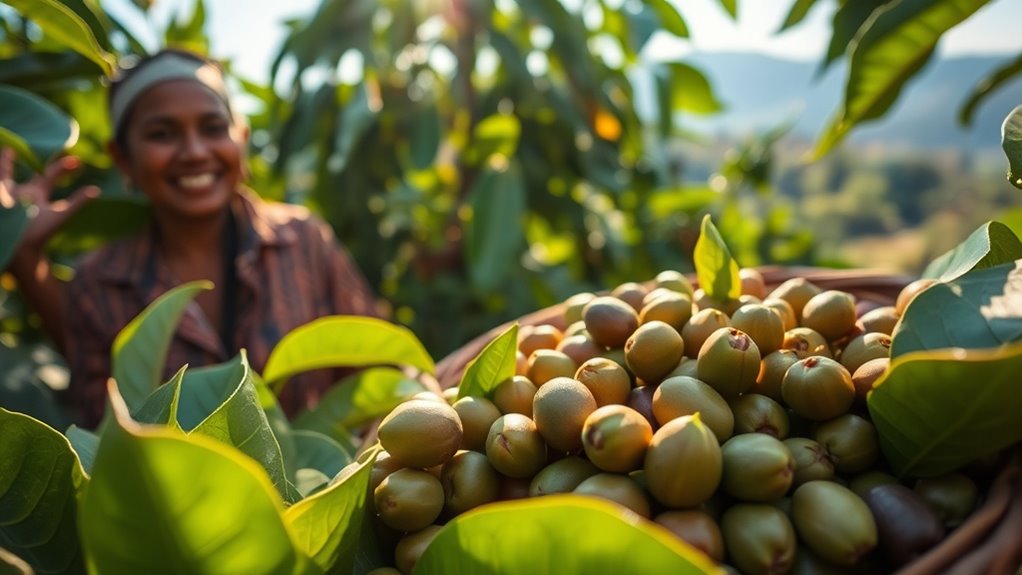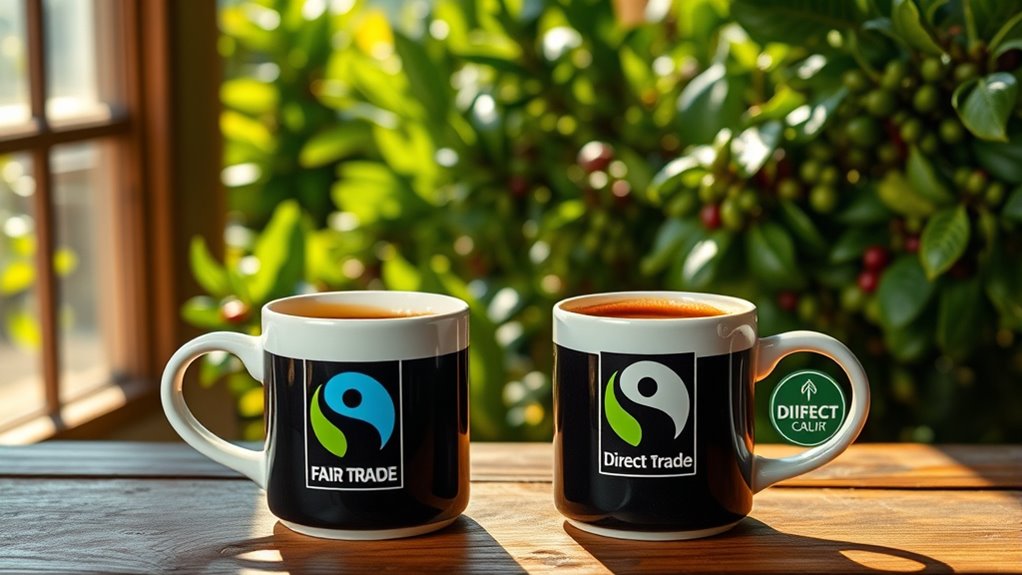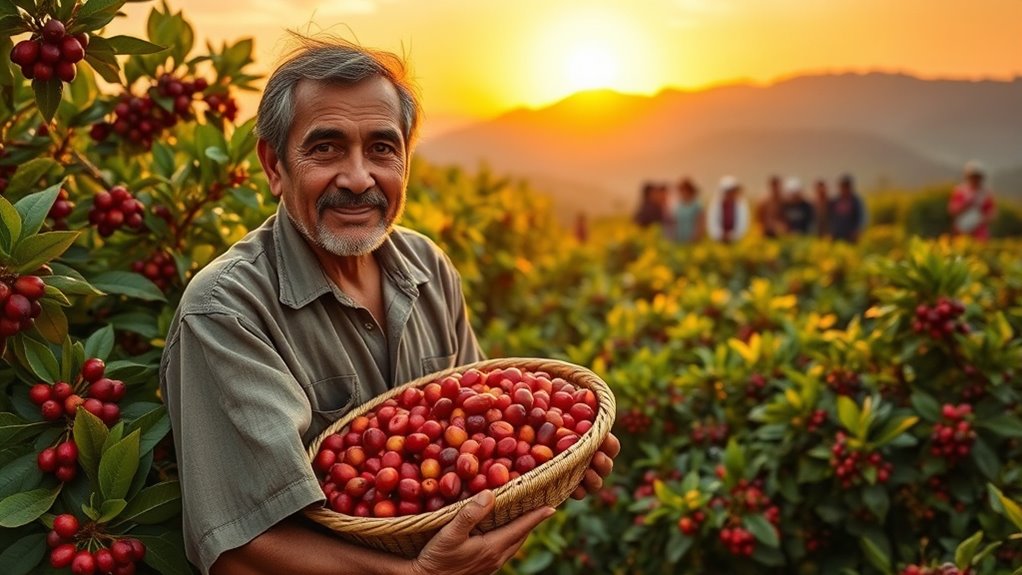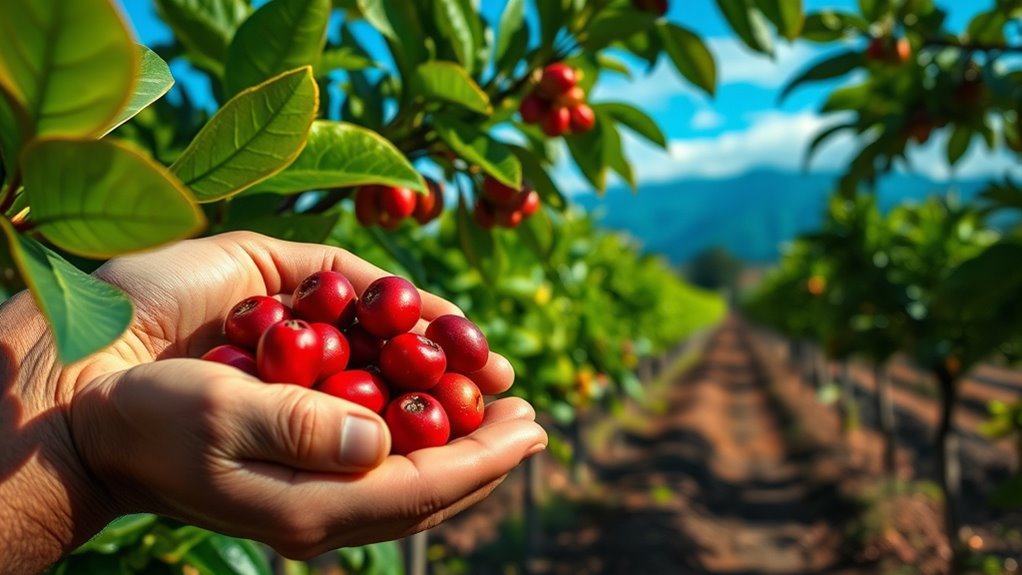Fair Trade coffee is all about ethical sourcing and sustainability. It guarantees farmers earn fair prices—typically $1.40 per pound—while working in safe conditions and using environmentally friendly practices. This movement not only supports community development but also combats child labor and exploitation. By choosing Fair Trade coffee, you’re making a conscious decision to uplift farmers and promote social justice. Want to discover more about how it impacts communities and the environment?
Key Takeaways
- Fair Trade Coffee ensures farmers receive a minimum price of $1.40 per pound, promoting economic stability and fair compensation.
- Certification guarantees safe working conditions and prohibits child and forced labor, fostering ethical treatment of workers.
- Sustainable farming practices are encouraged, protecting the environment and ensuring long-term viability of coffee production.
- Fair Trade supports community development through premiums, enhancing local economies and empowering marginalized farmers.
- Transparency in the certification process builds brand reputation and trust among consumers, reinforcing ethical consumerism.
Understanding Fair Trade Coffee

Fair Trade coffee is more than just a label; it represents a commitment to ethical sourcing and sustainable practices.
With Fair Trade certification, coffee farmers receive fair prices, typically a minimum of $1.40 per pound for Arabica coffee, plus a premium for organic products. This certification guarantees safe working conditions and prohibits forced or child labor, promoting sustainable farming practices.
Fair Trade certification ensures coffee farmers earn fair prices, guarantees safe working conditions, and promotes sustainable farming.
By connecting directly with international buyers, farmers enhance their business skills and reduce reliance on exploitative middlemen. The Fair Trade movement also tackles the economic struggles faced by these farmers, guaranteeing they can build better lives.
Additionally, investments in community development projects improve infrastructure, healthcare, and education, empowering farmers and their families to thrive.
The Certification Process for Fair Trade Coffee

When you explore the certification process for Fair Trade coffee, you’ll find several key organizations involved, like Fairtrade America and Fair Trade Certified.
Each has specific standards that producers must meet to guarantee fair practices. Understanding these requirements is essential for grasping how certification supports farmers and their communities.
Certification Organizations Overview
To guarantee coffee producers receive fair compensation and adhere to sustainable practices, several key certification organizations oversee the fair trade process. Fair Trade Certified and Fairtrade International are prominent names, each enforcing strict fair trade standards.
When producers seek certification, they must commit to paying fair wages that exceed the commodity price, ensuring economic stability. The certification process involves a financial investment that covers auditing costs, promoting transparency and compliance within the supply chain.
Regular audits from these organizations help maintain accountability, while also reinforcing sustainability efforts. Beyond fair prices, certification fosters community development by channeling fair trade premiums into local infrastructure, healthcare, and education initiatives, making a lasting impact on the lives of coffee farmers and their communities.
Certification Standards Requirements
Guiding the certification process for Fair Trade coffee involves meeting several critical standards that confirm growers receive fair compensation and adhere to sustainable practices. Coffee producers must comply with social, environmental, and economic criteria set by organizations like Fairtrade International. This guarantees they receive a minimum price, protecting them from market fluctuations.
Here’s a breakdown of key certification standards:
| Requirement | Description | Purpose |
|---|---|---|
| Minimum Price | Guaranteed price above commodity market | Stability for growers |
| Labor Conditions | Fair labor practices and rights | Confirm ethical treatment |
| Sustainable Farming | Practices that protect the environment | Promote eco-friendly methods |
| Compliance | Adherence to Fair Trade standards | Accountability |
| Audits & Transparency | Regular checks and reports | Confirm integrity in supply chain |
Fair Trade Coffee vs. Direct Trade Coffee

While both Fair Trade and Direct Trade coffee aim to support farmers and promote ethical sourcing, they differ considerably in their approaches.
Fair trade coffee involves a third-party certification process that guarantees farmers receive fair prices and a minimum price above the commodity price. This system not only supports community development through Fair Trade premiums but also mandates adherence to sustainable farming methods and environmental sustainability practices.
In contrast, Direct Trade encourages coffee roasters to build direct relationships with farmers, allowing them to define their own ethical sourcing standards. While this can lead to higher profits for farmers, it lacks the structured audits and universal standards found in Fair Trade certified coffee, leaving its environmental practices more variable.
The Importance of Fair Trade for Farmers and Communities

Fair Trade plays an essential role in improving the lives of farmers and their communities by providing them with fair prices and opportunities for growth. By guaranteeing a minimum price above market rates, Fair Trade guarantees farmers have stable incomes that help lift them out of poverty.
The Fair Trade premium allows you to invest in community development, enhancing healthcare, education, and infrastructure. By eliminating exploitative middlemen, you gain direct market access, improving your business skills.
Fair Trade certification promotes sustainable farming practices, guaranteeing the long-term viability of your community. Additionally, these initiatives help combat child labor and forced labor, providing safer working conditions for you and your family, ultimately fostering a healthier, more equitable environment for all.
Environmental Sustainability and Fair Trade Practices

Environmental sustainability is a core principle of Fair Trade coffee, as it actively promotes farming practices that protect the planet. By encouraging organic methods and prohibiting harmful chemicals, Fair Trade certification helps conserve biodiversity in coffee-growing regions.
You’ll find that sustainable farming practices reduce soil erosion and conserve water, supporting ecosystem preservation. When you choose Fair Trade coffee, you empower farmers to invest in environmentally friendly technologies, enhancing their crops’ resilience against climate change.
Additionally, Fair Trade premiums enable cooperatives to fund community development projects focused on environmental education and sustainable agricultural practices. By supporting Fair Trade coffee, you contribute to a healthier planet and promote agroforestry techniques that foster biodiversity and protect natural habitats.
How to Identify Fair Trade Coffee Products

To identify fair trade coffee products, start by looking for certification logos like Fair Trade Certified or Rainforest Alliance on the packaging.
You should also research brands to understand their ethical sourcing practices and the impact of your purchase.
Knowing these details helps you make informed choices that support fair trade principles.
Certification Logos Recognition
How can you be certain that the coffee you’re buying supports fair trade practices? Look for certification logos on the packaging—they indicate adherence to fair trade standards and guarantee farmers receive fair compensation.
Here are key logos to watch out for:
- Fairtrade International: Guarantees fair prices for farmers.
- Fair Trade Certified: Ensures sustainable farming practices.
- Fairtrade America: Focuses on social accountability.
- Rainforest Alliance: Promotes environmental and social standards.
- Fair for Life: Adapts to local conditions while meeting fair trade standards.
Research Brand Ethics
When you’re on the hunt for fair trade coffee, researching brand ethics is essential to guarantee your purchase truly supports farmers. Look for certified Fair Trade logos on packaging, which confirm compliance with fair trade standards. Check company websites for information on ethical sourcing practices and transparency in supply chains.
| Key Considerations | What to Look For |
|---|---|
| Certification Logos | Fair Trade Certified, Fairtrade International |
| Transparency Reports | Details on farmer payments and community projects |
| Direct Relationships | Partnerships with cooperatives |
| Brand Reputation | Customer reviews and industry ratings |
Frequently Asked Questions
Why Is Fair Trade Coffee Important?
Fair Trade coffee’s important because it guarantees farmers earn a fair wage, promoting their financial stability and independence.
When you choose Fair Trade, you’re supporting ethical practices that prevent exploitation and enhance community development through education and healthcare projects.
Plus, it encourages environmentally friendly farming methods, which benefit the planet.
What Is Fair Trade and Why Is It Important?
Imagine sipping a cup of coffee that not only wakes you up but also supports a better world.
Fair trade is a movement ensuring producers get fair compensation for their work. It’s important because it empowers farmers, promotes sustainable practices, and eliminates exploitative labor.
When you choose fair trade, you’re not just enjoying quality coffee; you’re also contributing to stronger communities and a healthier planet.
Your choice matters, and it can spark real change.
How Can You Tell if Coffee Is Fair Trade?
To tell if your coffee is fair trade, look for certification logos like Fair Trade Certified or Rainforest Alliance on the packaging.
These logos guarantee adherence to fair trade standards. You’ll notice fair trade coffee often costs more, reflecting ethical sourcing practices.
Additionally, check the product description for details on the fair trade premium paid to farmers.
If you’re looking for sustainability, also look for organic certification alongside fair trade labels.
What Are the Social Impacts of Fair Trade Coffee?
When you sip a cup of Fair Trade coffee, you’re not just tasting rich flavors; you’re also nurturing communities.
Fair Trade coffee uplifts farmers, ensuring they earn fair wages that breathe life into their families and neighborhoods. It fosters education and healthcare projects, turning dreams into reality.
Conclusion
In the world of coffee, choosing fair trade is like planting seeds of justice. By supporting fair trade coffee, you’re not just savoring a rich brew; you’re nurturing farmers and their communities. Each cup can spark change, ensuring that those who grow your coffee receive fair wages and work in safe conditions. So, next time you sip your favorite blend, remember—it’s not just coffee; it’s a commitment to a better, more equitable world.









